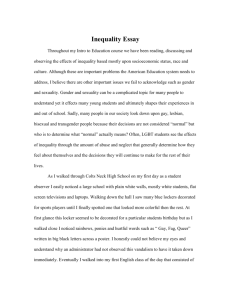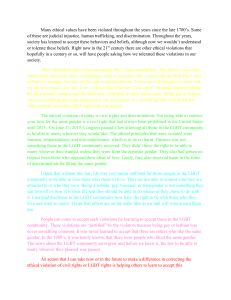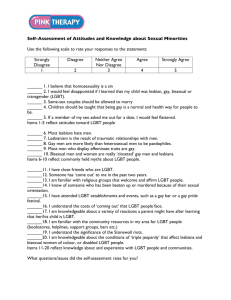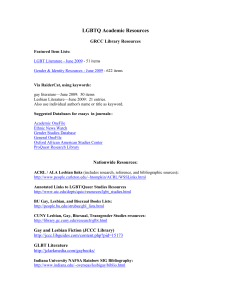N1125-10.19.2009
advertisement
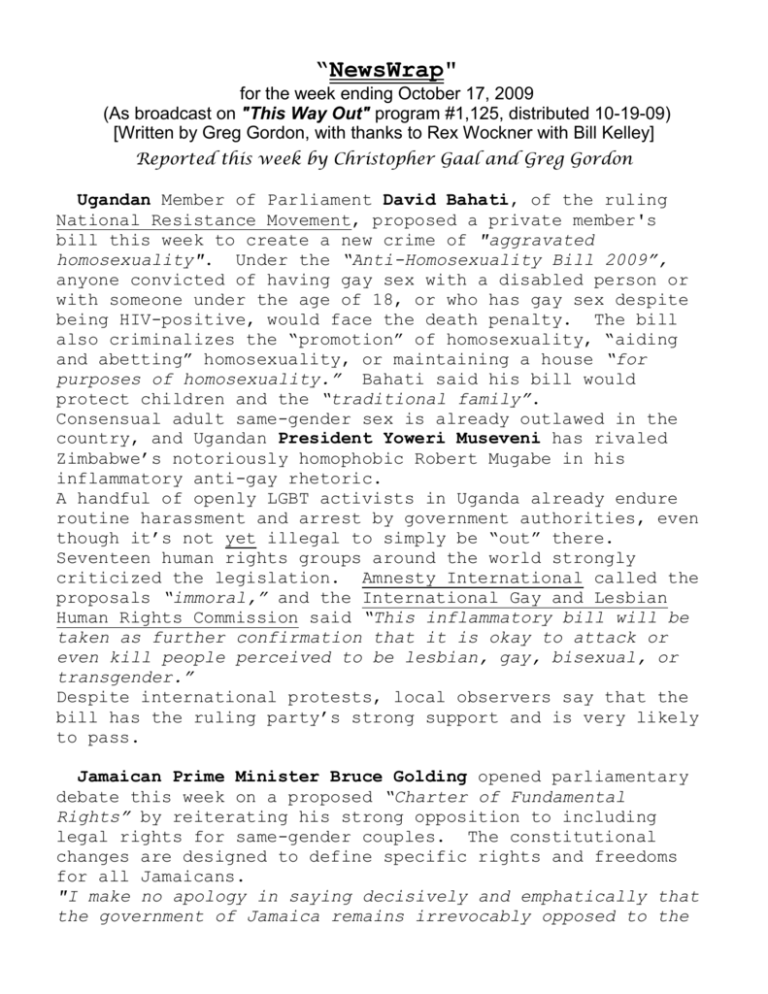
“NewsWrap" for the week ending October 17, 2009 (As broadcast on "This Way Out" program #1,125, distributed 10-19-09) [Written by Greg Gordon, with thanks to Rex Wockner with Bill Kelley] Reported this week by Christopher Gaal and Greg Gordon Ugandan Member of Parliament David Bahati, of the ruling National Resistance Movement, proposed a private member's bill this week to create a new crime of "aggravated homosexuality". Under the “Anti-Homosexuality Bill 2009”, anyone convicted of having gay sex with a disabled person or with someone under the age of 18, or who has gay sex despite being HIV-positive, would face the death penalty. The bill also criminalizes the “promotion” of homosexuality, “aiding and abetting” homosexuality, or maintaining a house “for purposes of homosexuality.” Bahati said his bill would protect children and the “traditional family”. Consensual adult same-gender sex is already outlawed in the country, and Ugandan President Yoweri Museveni has rivaled Zimbabwe’s notoriously homophobic Robert Mugabe in his inflammatory anti-gay rhetoric. A handful of openly LGBT activists in Uganda already endure routine harassment and arrest by government authorities, even though it’s not yet illegal to simply be “out” there. Seventeen human rights groups around the world strongly criticized the legislation. Amnesty International called the proposals “immoral,” and the International Gay and Lesbian Human Rights Commission said “This inflammatory bill will be taken as further confirmation that it is okay to attack or even kill people perceived to be lesbian, gay, bisexual, or transgender.” Despite international protests, local observers say that the bill has the ruling party’s strong support and is very likely to pass. Jamaican Prime Minister Bruce Golding opened parliamentary debate this week on a proposed “Charter of Fundamental Rights” by reiterating his strong opposition to including legal rights for same-gender couples. The constitutional changes are designed to define specific rights and freedoms for all Jamaicans. "I make no apology in saying decisively and emphatically that the government of Jamaica remains irrevocably opposed to the recognition, legitimization or acceptance of same-sex marriages or same-sex unions," he said. “Not as long as I sit here." He acknowledged to parliament that his position could further what he called "aggressive" efforts by some gay rights groups to discourage tourists from traveling to the Caribbean island nation or purchasing products made there. But, Golding said, “we remain steadfast in our determination that the values and culture must be protected and preserved." Jamaican reggae star Buju Banton, whose most infamous song “Boom Bye Bye” calls for the brutal murder of gay people, met this week with a few San Francisco government officials and LGBT activists. Other than being the first time Banton has ever met with LGBT people – arranged by his promoters prior to his controversial performance in the Bay Area later that night – the meeting apparently accomplished very little. He was reportedly asked to take meaningful steps to build bridges with LGBT community members, and even to donate royalties from “Boom Bye Bye” to his country’s major LGBT rights group J-FLAG, the Jamaica Forum for Lesbians, AllSexuals and Gays. Promoter Jonathan Mack told the “Bay Area Reporter” LGBT newspaper that Banton no longer performs "Boom Bye Bye," which he said Banton wrote almost 20 years ago when he was just 19 years old. But LGBT activists said that Banton performed the song as recently as 2007 in Jamaica, and noted that it’s still widely available on YouTube. In one of the videos, they claim, Banton yells "There is no end to the war between me and faggots." Banton reportedly repeated that statement when he called a Jamaican radio talk show this week. He said he would not "surrender" to LGBT demands because that would contradict his religion and culture. "I owe dem nothing,” the “Jamaican Observer” quoted him as saying, and “they don't owe I nothing." Several international rights groups have encouraged a boycott of Banton and other reggae performers whose lyrics promote violence against gay people. At least 16 concerts in Banton’s current U.S. tour have been cancelled following local protests. But the “BBC” reported this week that a group of well-known Russian singers and writers are calling for an end to discrimination against gays and lesbians. They met after a local official tried to close Moscow's longest-running gay club, Dusha i Telo, where many of the artists have performed. Activist Nikolai Alekseyev, who coordinated the meeting, said it was the first time celebrities had come together publicly to denounce homophobia. Pop star Lolita told reporters that anti-gay discrimination was in breach of the Russian constitution, and that "We think that this is a return to fascism." Consensual adult same-gender sex was decriminalized in Russia in 1993, and homosexuality was removed from the official list of mental illnesses in 1999. However, there are no laws against discrimination or harassment based on sexual orientation or gender identity, and same-gender relationships are not officially recognized. Elsewhere, the White House issued a statement this week regarding President Barack Obama’s position on anti-gay voter referenda in two U.S. states. It came in response to an inquiry from “The Advocate”, the country’s major LGBT news magazine. “The President has long opposed divisive and discriminatory efforts to deny rights and benefits to same-sex couples,” the statement read, “and as he said at the Human Rights Campaign dinner, he believes ‘strongly in stopping laws designed to take rights away.’" Maine’s Question 1 would overturn a law that legalized samegender marriage earlier this year; Washington's Referendum 71 asks voters to re-confirm an “everything but marriage” expansion of existing domestic partnership rights for samegender couples and some senior couples. Voters in both states will decide each measure on November 3rd. An initiative to repeal an LGBT anti-discrimination ordinance is also on the ballot in Kalamazoo, Michigan. A bill that would allow lesbian and gay couples to marry in Washington, D.C. has been introduced by Councilman David Catania, one of two openly gay council members. He said he hopes for a vote in December. It’s almost certain to pass, but Congress gets an opportunity to review D.C. legislation before it takes effect. Still, even opponents in Congress have acknowledged that the bill will likely become law. The city began in July to recognize same-gender marriages legally performed elsewhere. Congress didn’t even consider overturning that law. Religious opponents of marriage equality in the nation’s capital, led by the pastor of a Maryland church, Bishop Harry Jackson, vowed to take all possible legal action to overturn the legislation if it passes. A federal judge in San Francisco this week ruled that a high-profile lawsuit challenging the constitutionality of California’s Proposition 8, which stripped gay and lesbian couples of the right to marry last November, will go to trial in January as originally scheduled. Arguing that the lawsuit should be dismissed, Chuck Cooper, the attorney for Prop 8 proponents, said that only 5 states and 7 countries worldwide had legalized same-gender marriage. But, U.S. District Chief Judge Vaughn Walker asked, "How does same-sex marriage adversely affect opposite sex marriage?" "My answer is I don't know," Cooper surprisingly admitted. But he said that the state has a right to "stand back" and see how it plays out in "other jurisdictions, such as Massachusetts,” and not engage in a "radical experiment." Most observers agree that marriage equality, legal for 5 years now in the Bay State, has been economically beneficial and had no adverse impact. Massachusetts, in fact, has the lowest divorce rate in the country. California Governor Arnold Schwarzenegger this week signed a bill to make gay icon Harvey Milk’s May 22nd birthday an annual “day of significance” across the state. Under right wing pressure that was also exerted this year, Schwarzenegger vetoed a previous measure. But that was before the Oscarwinning movie “Milk”, President Barack Obama’s posthumous award of the Presidential Medal of Freedom to the slain San Francisco Supervisor, and Milk’s induction into the California Hall of Fame. According to Equality California, the bill “require[s] the governor [to] proclaim May 22nd each year as Harvey Milk Day. It encourage[s] public schools and educational institutions to conduct suitable commemorative exercises on that date.” The Governor also signed bills to expand services to LGBT survivors of domestic violence, and to recognize legal samegender marriages performed outside California. Under current law, however, they would not be seen as marriages, but would be recognized under the state’s existing domestic partnership laws. And finally, in a speech at Brigham Young University–Idaho this week, a leader in The Church of Jesus Christ of Latter Day Saints, Dallin H. Oaks, suggested that Mormons are facing the same type of intimidation over their support for California’s Proposition 8 that Southern Blacks suffered before passage of the Voting Rights Act in 1965. Oaks is a former Utah Supreme Court Justice and current member of the Quorum of the Twelve Apostles, a governing body that is second only to the First Presidency in the Church’s hierarchy. Criticizing minor harassment that’s been reported against a few LDS Church Prop 8 supporters, and what he called “alleged civil rights,” Oaks said the anti-Mormon backlash was an attack on religious freedom, and that it is "like the well-known and widely condemned voter-intimidation of blacks in the South that produced corrective federal civil-rights legislation." His remarks were blasted by LGBT and other civil rights groups. University of Utah historian Colleen McDannell rhetorically asked the “Salt Lake Tribune,” "Were 4 little Mormon girls blown up in the church at Sunday school? Were there burning crosses planted on local bishops' lawns? Were people lynched and their genitals stuffed in their mouths?” Jeanetta Williams, president of the NAACP's Salt Lake branch, said there is "no comparison... I don't see where the LDS Church has been denied any of their rights," she concluded. "What the gay and lesbian communities are fighting for, that is a civil-rights issue."

